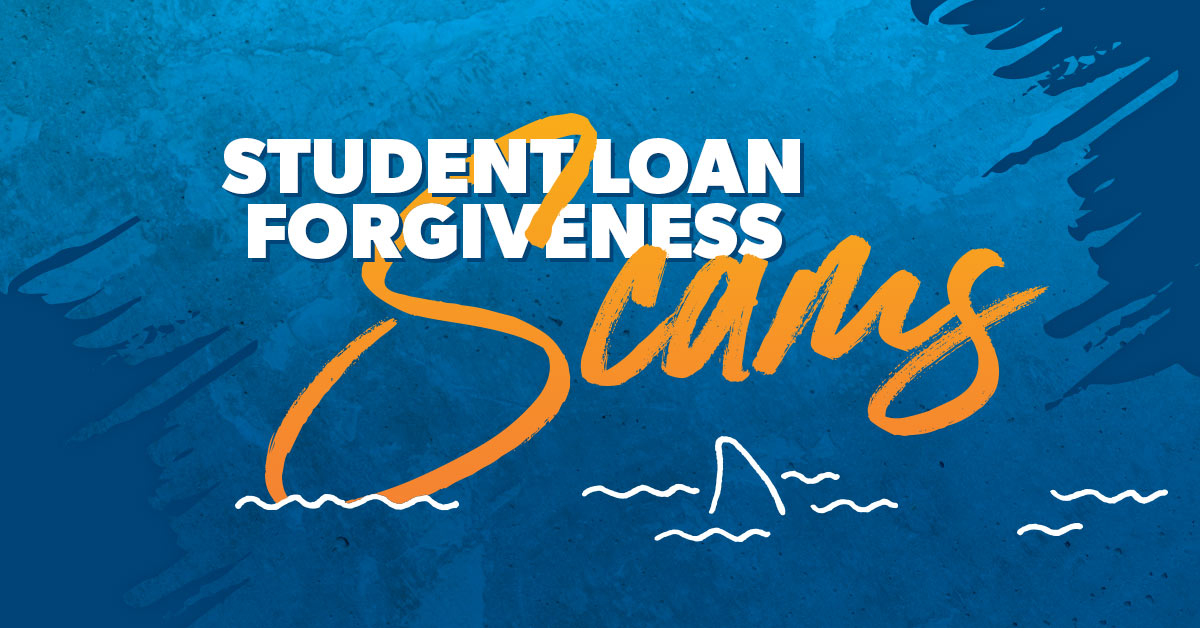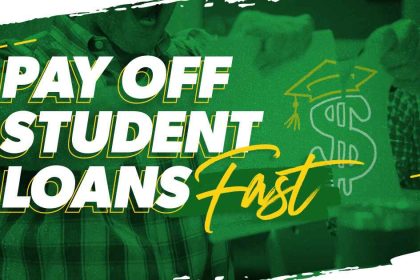Student loan forgiveness scams are the worst. It’s bad enough you’ve got student loans you need to pay off. Now, you’ve also got to watch out for scumbags trying to pull one over on you. But you don’t have to fall for it!
The sooner you can recognize student loan forgiveness scams when you see them, the more likely you are to avoid them—saving yourself time, money and stress. Let’s talk about the seven red flags to watch out for.
7 Ways to Spot Student Loan Forgiveness Scams
1. They Ask You to Pay for Loan Forgiveness
If someone says they can forgive your $150,000 student loan balance for the “small fee” of $5,000 up front, don’t believe them. They’ll take your money, and you may never hear from them again . . . plus, you’ll still have your student loans.
There’s no charge to apply for federal student loan forgiveness programs. Most of the time, debt-relief companies that ask you to pay a fee for their services will just set you up with an income-driven repayment (IDR) plan or enroll you in the Public Student Loan Forgiveness (PSLF) program—both of which you can do for free through your loan servicer.
Bottom line: Steer clear of anyone wanting you to pay them for loan forgiveness.
2. They’re Not a Legit Student Loan Company
Some scammers will lie and say they’re calling on behalf of the Education Department, when they’re really just working out of a sketchy call center. That’s why it’s important to know who your loan servicer is—so you can know if they’re telling the truth or not.
Here is the list of loan servicers the federal government works with:1
- Edfinancial
- MOHELA (Missouri Higher Education Loan Authority)
- Aidvantage
- Nelnet
- OSLA (Oklahoma Student Loan Authority) Servicing
- ECSI (Educational Computer Systems, Inc.)
- Default Resolution Group
And even if they get your loan servicer’s name right, double-check their contact info—including email addresses, phone numbers and website URLs. Some scammers even use official-looking logos to try to trick you, so stay alert! When in doubt, contact the Federal Student Aid office.
Just so you know, the Federal Student Aid office will usually contact you by email or text:
- Official emails will come from [email protected], [email protected] or [email protected].
- Official texts will come from 227722 and 51592.
3. They Ask for Your Log-in Info
If there’s one thing scammers would love to get their hands on, it’s your personal information. But any legit government agency won’t ask for your student loan account log-in information.
So, don’t give anyone your Federal Student Aid ID or any passwords. Some of these scammers will say they need it to act on your behalf—but that’s a lie.
Now, you may need to give your Social Security number when applying for federal student loan forgiveness. But otherwise, guard that number with your life to prevent identity theft!
If you’ve given someone your log-in info and think your student loan account might be at risk, contact your loan servicer and explain the situation. They should help you reclaim your account so those slimeballs can’t cause any more trouble.
4. They Advertise on Social Media
Don’t trust student loan forgiveness companies advertising their services on social media. This is usually a sign that they’re a for-profit company (not working with the government) and they’re looking for people to take advantage of.
Ready to get rid of your student loans once and for all? Get our guide.
Some are even using social media ads to gather your information to sell to other companies. (Geez, don’t they have anything better to do?) Their ads will ask you to complete a form or call someone for more details. Then, they’ll sell your information to someone else, who will carry out the scam. These are known as lead-generating companies, but we call them what they really are: con artists.
5. They Pressure You to “Act Now”
Student loan forgiveness scams can be downright ruthless.
They tend to target desperate borrowers with massive amounts of student loan debt and pressure you to “act now or miss out on this one-time student loan forgiveness.”
But listen, anyone playing the urgent card when it comes to student loan forgiveness is a bona fide scammer. You can take as much time as you need to make the right decision about what to do with your student loans. And any official forgiveness will usually have a reasonable deadline you need to apply by.
So, if someone is threatening you or saying that you’ll lose your one chance at loan forgiveness if you don’t give them money ASAP, hang up the phone and never talk to them again.
6. They Ask You to Give Them Power of Attorney
Pay close attention to what you’re being asked to sign. If a student loan forgiveness company wants you to sign a power of attorney agreement so they can take action on your behalf, whatever you do—Don’t. Sign. It.
Power of attorney agreements are legally binding documents that say someone can make financial and legal decisions as if they were you. And handing that over to a scam company gives them the power to do some real damage to your finances and your life.
You don’t want these frauds opening accounts or making major decisions in your name! And again, you don’t need anyone to enroll in an income-driven repayment plan or apply for federal loan forgiveness on your behalf.
Always read the fine print and do your research if you want to save yourself the headache (and financial loss).
7. Their Promises Sound Too Good to Be True
If it sounds too good to be true, it probably is. So, if you get a call from someone saying something like, “You’re suddenly qualified for immediate student loan forgiveness,” put your guard up.
Most student loan forgiveness requires years (sometimes decades) of making qualifying payments or working a specific job. Most likely, you already know if you’re enrolled in a forgiveness program or a payment plan that promises forgiveness after a certain number of payments.
So, if you get notified that you’re eligible for immediate loan forgiveness out of the blue, it’s probably a scam. Your best bet is to call your loan servicer to find out if it’s real.
Oh, and don’t believe those fake federal student loan forgiveness calls that say Presidents Biden’s forgiveness plan suddenly went through. That plan was shot down by the Supreme Court. But if you’re ever not sure, any approved sweeping student loan forgiveness will be communicated on the Federal Student Aid website.
And sorry, but private student loan forgiveness isn’t really a thing. Government forgiveness programs only deal with federal student loans, and there’s no way private lenders will forgive your loans if they don’t have to. So, don’t believe scammers who say they’ll set you up with a government program to knock out your private loans. That’s a bold-faced lie!
How to Report a Student Loan Forgiveness Scam
If you think you’ve been scammed, reach out to your federal loan servicer to make sure your account hasn’t been messed with. And if you sent the scammer any money, call your bank ASAP and tell them to cancel the payment.
Also, be sure to report any scammers to the Consumer Financial Protection Bureau, the Federal Trade Commission, and the Federal Student Aid office. By putting these creeps on the government’s watch list, hopefully you can keep them from hustling anyone else!
Don’t Get Scammed—Have a Plan
There’s no shortcut to student loan forgiveness. And if you ask us, even the federal loan forgiveness programs aren’t all they’re cracked up to be. Too often, they string you along for years with promises of eventual forgiveness—only to leave you hanging and hopeless.
Honestly, the whole student loan industry is one big scam.
You can’t wait on the government (or anyone else) to make your student loan debt disappear. You’re going to have to take control of your student loans yourself. And your first step is to get on a budget.
A budget puts you in charge of your money. Making a plan for your paycheck every month helps you confidently cover your student loan payment—and even helps you find ways to increase your payment.
Trust us, budgeting is the best thing you can do to start getting rid of your student loans. Go ahead and create your first budget for free with EveryDollar!
Because when you’ve got a plan to pay off your student loans, you won’t be as tempted to take the bait when some scammer tries to reel you in.
Guide to Getting Rid of Your Student Loans
Find out everything you need to know about student loan forgiveness, budgeting for your student loan payment, and how to pay off your student loans fast!
Get the Guide
Read the full article here






